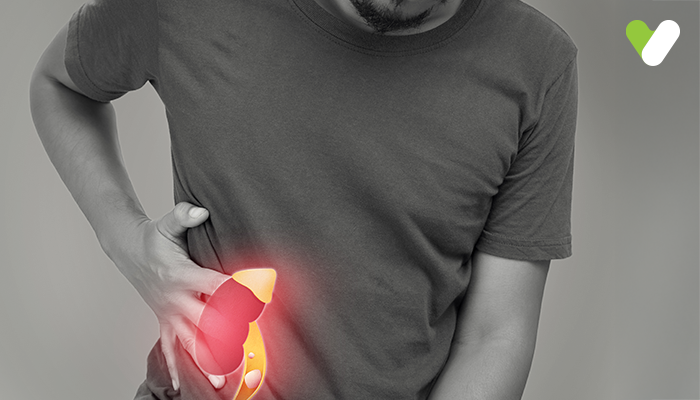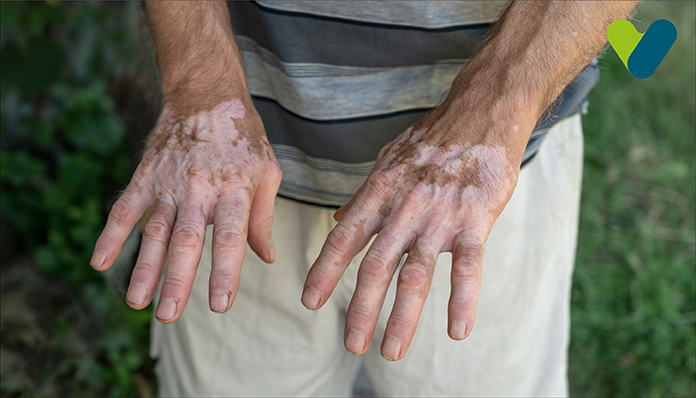Mr. Anubhav (45-years-old) works in the accounts department of a company. Over the past few months, he is suffering from a sharp pain in the lower abdomen and some problems in urination. Initially, he took some OTC painkillers to control the pain. But he didn’t get much relief from the pain and irritation. So, Mr. Anubhav consulted a doctor to ease his pain. After diagnosing and doing some tests, the doctor informed him that he has kidney stones. Though the sizes are small, hence operation is not needed initially. The doctor gave him some medications and advised him to follow a specific kidney stones diet to improve his symptoms and conditions. After following the doctor’s advice and avoiding foods that cause kidney stones, Mr. Anubhav has experienced some improvements in his symptoms.
What are Kidney Stones?
Kidney stones are small and hard build-ups that are found in kidneys. They usually develop if there is a decrease in urine or enhancement in some particular substances, such as minerals and salts. Your diet plays a pivotal role in preventing them.Kidney stones may give you excruciating pain and swelling. According to the National Kidney Foundation, nearly 9% of women and 19% of men in the United States are suffering from kidney stones.
Common kinds of kidney stones include:
- Calcium oxalate stones
- Calcium phosphate stone
- Struvite stones
- Uric acid stones
- Cystine stones
A plethora of factors that are responsible for kidney stones are:
- High oxalate intake from certain foods
- A high protein diet
- Excessive sodium
- Dehydration or inadequate fluid intake
Diet In Kidney Stones
Some food items come up with certain chemicals or compounds that will stimulate the production of kidney stones. If you consume these items regularly, your condition will worsen. By restricting the consumption of these foods, the risk of kidney stones diminishes.Diet Recommendation for People with Kidney Stones
1. Drink Adequate Fluid: 2-3 quarts/day
You can include any type of fluid like water, coffee, and lemonade into your diet. These fluids are beneficial to your kidney stone. Consume any type of fluids except grapefruit juice and soda. This will produce less concentrated urine and will also enhance the volume of urine (at least 2.5L/day)2. Limit Foods with High Oxalate Content
Spinach, many berries, chocolate, wheat bran, nuts, beets, tea, and rhubarb should be discarded from your diet regime.3. Eat Enough Dietary Calcium
Three servings of dairy per day will minimize the production of calcium stone formation. Eat dairy items with meals.4. Don’t Take Extra Calcium Supplements
If you need to take calcium supplements, then they should be prescribed by your physician and registered kidney dietitian.5. Eat a Moderate Amount of Protein
If you consume more proteins, then it will force the kidneys to excrete more calcium. In this way, more stones will be formed in the kidney6. Avoid High Salt Intake
High sodium foods will enhance the level of calcium in the urine that will uplift the chances of developing stones. Thus, experts always recommend consuming a low-salt diet to control blood pressure.7. Avoid High Doses of Vitamin C Supplements
The US Dietary Intake recommends taking only 60mg/day of vitamin C to kidney stone patients. Excess amounts of 1000mg/day or more may stimulate the production of oxalate in the body.Foods To Avoid with Kidney Stones
While choosing the food items for your diet, you should avoid those items that will stimulate the stone developing process in your body.List of Foods that Cause Kidney Stones
- High-sodium based foods, including processed, packaged foods as well as meals from fast food establishments
- Some animal proteins, including eggs, fish, pork, and beef
If a person is suffering from calcium oxalate stones, then he may restrict his consumption of the following foods. Because these foods are rich in oxalate and also enhance the chance of recurrence.
- Nuts
- Peanuts
- Spinach
- Wheat bran
- Rhubarb
Kidney stones are not the same for all, and thus, everyone’s needs and dietary requirements will vary. The prime objective of your kidney stone diet is to prevent recurrent kidney stones. Thus, you should always consult a doctor or dietician who has plenty of experience in this field. Only they can identify the type of kidney stone you are having and ways to prevent or avert its development.
What Is the Utmost Important Factor to Prevent Kidney Stone Formation?
- You should drink plenty of water to avoid kidney stones. This will improve frequent urination and thus, will prevent the building up of calcium or uric acid.
- Though yoga and exercise are good for health, people lose a lot of water through sweating due to these activities. This may lead to less urine production, especially on summer days. As a result, stone-causing minerals will settle and deposit in the kidneys and urinary tract.
- Always keep hydrated especially while doing physical activities that cause a lot of sweating. Drink 2.5-3 liters per day or 8-12 cups per day to synthesize a good amount of urine. Don’t drink sodas (especially those with high amounts of fructose), sweetened iced tea, and grapefruit juice.
- Dietary changes are beneficial for some people in preventing kidney stones from recurring. Sometimes, you may need additional treatments like medications to break down the stones or surgery to extirpate the stones.


